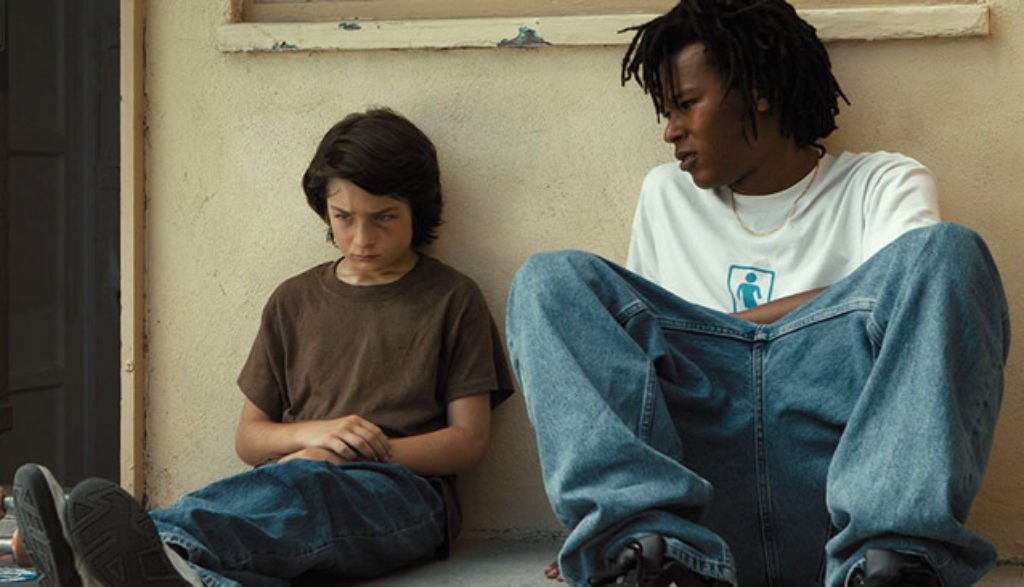
The 1990s.
A time before smartphones, social media and Netflix.
A time for Walkmans, VCRs and boy bands.
And for some, a time to skateboard.
In the mid-’90s, Stevie is 13. He’s trying to discover who he is and where he belongs. He looks to his mom for guidance, but mostly lives in a world without boundaries. He looks to his big brother, Ian, but mostly finds physical abuse and rejection. No matter where Stevie turns, he comes up empty-handed.
One day, Stevie passes by some teen guys boarding near the Motor Skate shop. He longs for the community he sees. So Stevie takes a risk, introducing himself.
There, He meets Ray, a wise-beyond-his-years African-American teen who is genuinely interested in others. He meets another guy nicknamed F—s—, who likes to party. Meanwhile, a poor white teen dubbed Fourth Grade dreams of becoming a filmmaker. And Ruben, the youngest of the bunch, will do anything to maintain his spot in the group and to stay away from his abusive mom.
The boys are a study in contrasts: broken, yet hopeful. Vulgar, yet somewhat innocent. Poor, yet carefree. Vulnerable, yet resilient. Tender, yet already hardened to life’s hurts.
In this raw coming-of-age story, parents take a back seat as a group of teen boys seeks meaning and refuge amid the jagged realities of their painful, profane and poignant lives.
Ray, Stevie’s skating friend and pseudo-mentor, is the wisest of the bunch. He’s older (maybe 17 or 18), and he longs to get away from the chaos that has largely defined his life. He aspires to get out of “the hood” and make something of himself—hopefully, to become a professional skateboarder. He also tries to steer the younger guys in healthier directions, away (mostly) from drugs, alcohol and partying.
At one point, Ray tells Stevie that everyone has their own story and that it’s important to be thankful that your life isn’t as hard as it is for others. Ray also tells Stevie that he doesn’t have to take “such hard hits,” a message to each of the boys that it’s OK to be vulnerable and show weakness.
The guys find a family of sorts within the skating community. They also find joy skating together. For most, their home lives are less than desirable. So when one of them goes to the hospital after a bad car accident, the entire group sleeps in the lobby and is there to support one another.
Stevie and his friends have conversations about race and ethnicity and, though drenched in profanity, ultimately embrace a positive outlook on life. Ray and F—s— also sit down with a homeless man, encouraging him and listening to his story.
The boys understand that they are often stereotyped unfairly, being seen as vandals and misfits simply because they skate. Surprising self-awareness fills several conversations, demonstrating that the guys are capable of deep introspection and care about things that go beyond shallow stereotypes. Ray briefly discusses his feelings toward people who discriminate against him for his skin color. He labels such discrimination and racism “ignorance.”
Stevie’s mother often makes poor choices. But she does eventually become aware of Stevie’s friends and tries (albeit not very effectively) to guide her son’s interactions with them, fearing (somewhat fairly, somewhat unfairly) that they’re a bad influence on him.
Someone tells a police officer that he “needs Jesus.”
Stevie has a sexual experience with an older teenage girl. She leads him into a bedroom, directing their encounter. She’s shown in a bra and underwear, and Stevie’s shown wearing only his boxers. Later, Stevie graphically relates to his friends the explicit details (involving genitals, but not sexual intercourse) of what happened. In another conversation, the boys have an extraordinarily crude “Would you rather?” session that deals with the gross-out intersection of oral sex, rape and parents.
Stevie and Ian’s mother tells them about her sexual interest in a man (whom we later see walk out of her bedroom with his pants unzipped and shirt disheveled). Ian, Stevie’s older brother, tells Stevie about a time (before Stevie’s birth) when their mother had male visitors in and out of the house frequently. He crudely says that he could hear the sexual sounds from her room.
Likewise, the film’s young adolescents often use the f-word to talk about sex. They verbally objectify and demean women, calling them “b—ches.” A few of them catcall women as well.
Teens talk about dating and sex. The guys often go shirtless; one of them is shown in his boxers. Some teen girls wear revealing outfits. A poster of a nearly naked woman is seen hanging in Stevie’s bedroom.
Ian is often violent. He frequently punches Stevie in the face, chest and stomach; he also shoves his little brother’s face into the ground. In one scene, Ian throws Stevie against a wall (knocking him out). Stevie later stands in front of the mirror, inspecting the bruises and scars on his chest. When Ian is later taunted by Stevie’s older friend, F—s—, he does not retaliate. The film suggests that Ian’s violence is a misguided attempt to compensate for his own shortcomings and insecurities.
In one graphic scene, Stevie runs home, infuriated and embarrassed, and tries to kill himself by wrapping an electrical cord around his neck. As the movie progresses, though, Stevie does not take abuse lightly. He gets into a fight with Ruben, punching him repetitively. He stands up to his brother, hitting him as well.
Elsewhere, a group of kids is in a terrible car accident, leaving one of them in the hospital with a broken arm and other injuries. We hear later that a young boy and his sister are frequently beaten by their mother and that a child was hit by a car and killed while crossing the street.
When Stevie begins to skate more frequently, he often falls and hurts himself. Once, he tries to make a dangerous jump on a roof and plunges down, hitting his head and knocking himself out. (His head begins to bleed and his friend’s wrap multiple shirts around it).
A boy makes a sarcastic quip about cutting off his genitals.
God’s name is misused about 10 times. Jesus’ name is abused at least once. We also hear nearly 100 f-words and about 55 s-words. “N-gga” is uttered more than 30 times. Other frequently used profanities include “b–ch,” “h—,” “a–hole,” “a–,” “d–n,” “d–mit,” “d–k” and “p—y.” Some profanities are heard on the film’s soundtrack, too.
As already mentioned, a teenage boy is known by his friends as F—s–t. That profane nickname is uttered many times. Teen girls are called “hoes” and “b–ches.” The guys frequently refer to one another as “f-ggots,” “p—ies,” “idiots,” “dumb” and “retarded.”
Adolescent boys and girls smoke cigarettes and marijuana. Kids drink hard liquor and beer (once from a beer bong) and are often drunk. Some drinking takes place at parties; excessive drinking is treated casually (even ignored) by adults and other teens. One guy makes it known that he is only interested in activities that allow him to get drunk and high. Later, he drives to a party while intoxicated.
Ian alludes to his mother’s former alcohol and drug use. Stevie and some of his friends take prescription pills (that aren’t theirs) “for ADD.”
Throuout the film each of the boys desperately seeks to belong somewhere, often in ways that are deterimental to others around them. Most of them give into peer pressure without a second thought. They’ll take up bad habits for the sake of saving face. When members of the group feel threatened, they’re apt to verbally and physically degrade their friends (and make reckless decisions) for fear that they will be ousted.
We learn that Stevie’s mother had Ian when she was just 18. She seems inexperienced as a parent and, most likely, overwhelmed by the burden of being a single mother. Perhaps because of those factors, she has no boundaries, and she’s disconnected from and unable to effectively communicate with either of her children. She screams profanities at her boys (and vice versa), lets them stay out late into the night, does not enforce rules and rarely takes notice of looming familial issues.
And it isn’t just Stevie’s mother who acts this way, but virtually all of the parents and parental figures in the film. (We only see Stevie’s mom’s bad behavior and choices, but we hear similar stories from most of the other guys in the group.)
Ian encourages Stevie to steal money from their mother, and Stevie later denies that he did so. (He also lies to his mom about smoking and drinking.) The boys break into the school yard illegally, urinate on the ground and skate around the courthouse (which is also illegal, and a few kids are caught by cops as they flee the scene). Each of the guys has a difficult home life; one boy is so poor that he can hardly afford to buy socks. One child is clearly favored within a family.
Where are their parents?
That was my thought throughout this entire film.
Each of these young boys suffers from abusive homes and tragic incidences. They’re forced to grow up fast, but the lack of parental love, support and supervision forces them into situations that would have never happened had mom or dad been around to care.
In an interview with TIFF Talks, Jonah Hill said of the Mid90s, “Although it’s not a bio pic, it is a personal story … about what skateboarding gave me at the time which was a family outside of my home, and a point of view and an ethic. … I think skateboarding brings together a group of individuals that form a family.”
I will give credit to Hill for the realistic vibe of this film, especially its wince-inducing snapshots of emotional and physical abuse. You feel for each of these kids. You care about their lives. You want to fix all of their issues. You’re drawn in, in a very real way. And you understand how a group of cast-off adolescents like these might band together to form the only “functional home” they’ve ever known.
But of course, even this “functional home” is deeply, disturbingly dysfunctional. The violence here is hard to watch, especially when an older brother beats his younger sibling. The emotional breakdowns are difficult to endure. The personal stories are tragic. The lack of parental support is heart wrenching. And there’s a ton of profanity, drinking, drug use and sexual content involving young teens, too.
Mid90s is a hard film. And although it’s about kids, it is certainly not for them.


Kristin Smith joined the Plugged In team in 2017. Formerly a Spanish and English teacher, Kristin loves reading literature and eating authentic Mexican tacos. She and her husband, Eddy, love raising their children Judah and Selah. Kristin also has a deep affection for coffee, music, her dog (Cali) and cat (Aslan).